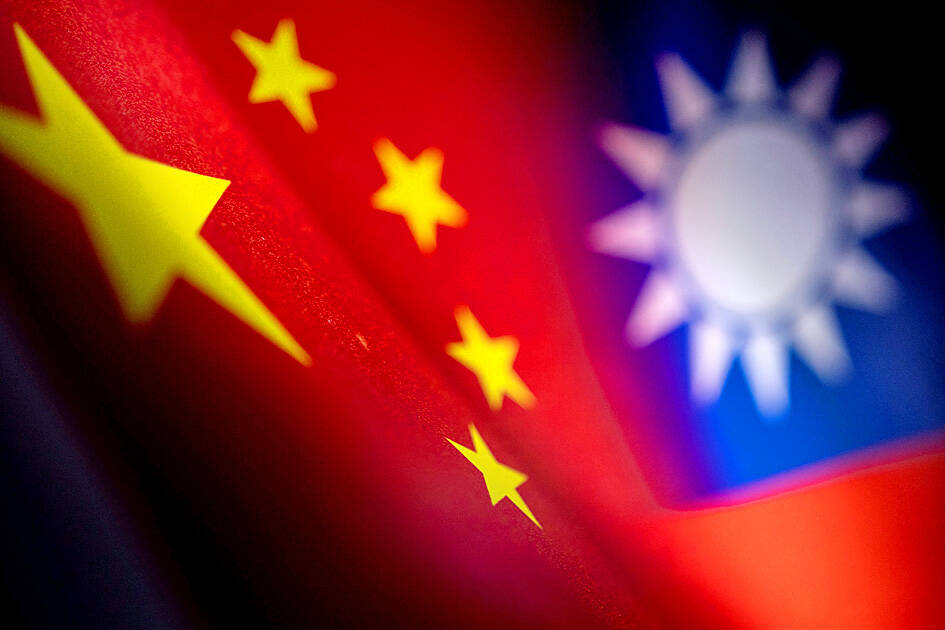Signing a cross-strait “peace agreement” would be the most dangerous outcome, Democratic Progressive Party (DPP) Legislator Puma Shen (沈伯洋) said on Friday in reaction to a think tank report on the potential economic and cyberwarfare tactics China might use on Taiwan.
The Washington-based Foundation for Defense of Democracies released a report on a tabletop exercise it recently organized to analyze how vulnerable Taiwan is to China’s economic and cyber warfare tactics, warning that Beijing might use those to compel Taipei to surrender without military force.
Commenting on the matter, Shen said that China is already using these kinds of “gray zone” tactics — such as harassment, disinformation, and economic, legal and cyber attacks — as part of a hybrid warfare strategy.

Photo: Reuters
The most dangerous outcome would be China forcing Taiwan into signing a “peace treaty” under duress, which would turn the invasion of the nation into a domestic issue rather than an international act of war, he said.
China has been using “gray zone” tactics even during peacetime, such as its attempts to manipulate public opinion, launching of cyberattacks on Taiwan’s digital infrastructure, encroaching on the nation’s territorial waters, and placing economic sanctions on industries, companies and individuals that are reliant on China’s market, Shen said.
If China suddenly escalated tensions, for example, by launching cyberattacks on critical infrastructure such hospitals, it would be difficult for Taiwan and its allies to determine if it was an act of war, he said.
Shen said he agreed with the think tank’s report, which said that “gray zone” warfare is Taiwan’s biggest concern and that war simulations must include these tactics as part of modern hybrid warfare.
He said he has long advocated for a hybrid war strategy, as solely depending on military force would not be enough to defend the country from modern threats.
China’s goal is to push Taiwan into signing an agreement, perhaps even bypassing the central government and negotiating with local governments directly, to make the invasion a domestic issue and prevent foreign intervention, Shen said.
Some lawmakers have promoted the possibility of a peace agreement, which plays into China’s plans and poses a significant threat to Taiwan, he added.
China’s cyberattacks against Taiwan have increased dramatically since 2016, with recent reports saying that Beijing has been working with Russian hackers, Shen said.
Taiwan should analyze and examine every small attack to prevent further exploits and fix vulnerabilities, he added.
Shen compared these small attacks to disassembled rockets smuggled in discreetly: each individual piece could become small vulnerabilities that could one day be used in a massive attack.

Chinese spouse and influencer Guan Guan’s (關關) residency permit has been revoked for repeatedly posting pro-China videos that threaten national security, the National Immigration Agency confirmed today. Guan Guan has said many controversial statements in her videos posted to Douyin (抖音), including “the red flag will soon be painted all over Taiwan” and “Taiwan is an inseparable part of China,” and expressing hope for expedited reunification. The agency last year received multiple reports alleging that Guan Guan had advocated for armed reunification. After verifying the reports, the agency last month issued a notice requiring her to appear and explain her actions. Guan

The Kaohsiung Tourism Bureau audited six hotels in an effort to prevent price gouging ahead of Korean band BTS’ concert tour in the city scheduled for Nov. 19, 21 and 22 this year. The bureau on Friday said that the audits — conducted in response to allegations of unfair pricing posted on social media — found no wrongdoing. These establishments included the local branches of Chateau de Chine, Hotel Nikko, My Humble House, and Grand Hai Lai, it said, adding that the Consumer Protection Commission would have penalized price gougers had the accusations been substantiated. The bureau said the Tourism Development Act

GIVE AND TAKE: Blood demand continues to rise each year, while fewer young donors are available due to the nation’s falling birthrate, a doctor said Blood donors can redeem points earned from donations to obtain limited edition Formosan black bear travel mugs, the Kaohsiung Blood Center said yesterday, as it announced a goal of stocking 20,000 units of blood prior to the Lunar New Year. The last month of the lunar year is National Blood Donation Month, when local centers seek to stockpile blood for use during the Lunar New Year holiday. The blood demand in southern Taiwan — including Tainan and Kaohsiung, as well as Chiayi, Pingtung, Penghu and Taitung counties — is about 2,000 units per day, the center said. The donation campaign aims to boost

BACK TO WINTER: A strong continental cold air mass would move south on Tuesday next week, bringing colder temperatures to northern and central Taiwan A tropical depression east of the Philippines could soon be upgraded to be the first tropical storm of this year, the Central Weather Administration (CWA) said yesterday, adding that the next cold air mass is forecast to arrive on Monday next week. CWA forecaster Cheng Jie-ren (鄭傑仁) said the first tropical depression of this year is over waters east of the Philippines, about 1,867km southeast of Oluanpi (鵝鑾鼻), and could strengthen into Tropical Storm Nokaen by early today. The system is moving slowly from northwest to north, and is expected to remain east of the Philippines with little chance of affecting Taiwan,